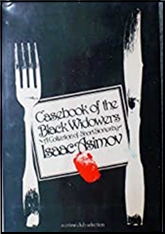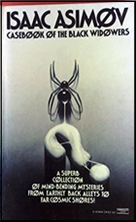Sat 19 Feb 2022
An Archived Mystery Review by Doug Greene: ISAAC ASIMOV – Casebook of the Black Widowers.
Posted by Steve under Reviews[7] Comments
ISAAC ASIMOV – Casebook of the Black Widowers. Doubleday Crime Club, hardcover, 1980. Fawcett Crest, paperback, 1981.

After three books about the Black Widowers, containing 36 stories (and no indication that the series is nearing its end), it’s time to pay tribute to Isaac Asimov’s accomplishment. Though the stories are often compared with Baroness Orczy’s The Old Man in the Corner, they seem to me to belong in a different area of the so-called mystery story.
The Old Man is fundamentally a detective, though an intuitive one who is seldom interested in evidence. Henry, who solves the problems in the Black Widowers stories, interprets word-plays, conundrums, anagrams, without worrying about crimes or indeed rarely about anything more significant than the word-play itself.
Perhaps this point will become clearer if I do two things which The Poisoned Pen has always rightly abhorred: I shall become dryly academic while at the same time, grossly oversimplifying a complex matter.
To pontificate: There is a continuum of types of fiction dealing with the unravelling of a problem:
Riddleâž” Puzzleâž” Mysteryâž” Detection
A Riddle is limited to elucidating a single point, often related to how a word is used, or how a single object or an event can be viewed from an unexpected angle. A Puzzle normally involves more than one occurrence or one word, but it is still usually limited to a small part of the characters’ lives. The Puzzle story shades almost imperceptibly into the Mystery, the main distinct:ton being the significance of the problem to be resolved. Unlike the Puzzle, a Mystery involves most aspects of the characters’ lives, at least as reflected in the story. A Mystery becomes Detection when one character gathers evidence in a systematic (and normally, though not always, active) way.
End of lecture.
Back to the point: The Black Widowers stories are almost always riddles, occasionally puzzles, and never mysteries or detection. As such they fit into the grand line of tales going back to Anglo-Saxon riddles (and probably earlier), and they should not be criticized for being gimmicky or based on tiny points.

When Barzun and Taylor said that the Black Widowers tales are “something of a stunt” (The Armchair Detective, January 1978), they were entirely accurate — but in making such a statement a negative criticism, they were judging riddle stories by the-wrong standard. Asimov’s work should be judged on two· grounds: First, how good a riddle is posed; second, how convincing or entertaining are the surrounding parts of the tale.
To take the latter point first: Asimov’s male-chauvinist club is very well handled. The various characters are well-delineated. The conversations are · not only fascinating for themselves but they often set the tone for the problems; note especially the first Black Widowers volume in which The Iliad is retold in limericks and other lively topics are introduced.
On the other hand, the stories as stories (rather than merely as riddles) are rather static. Despite the presence of a different guest in each tale, the stories vary little and seem rather remote from human worries and from human activities.
Asimov might be wise in future tales to vary the setting or make the riddles more immediate to the Widowers. (But Asimov would probably rightly retort that such changes would produce something entirely different from a riddle story.)
It is in the first point, the riddles themselves, that Asimov shines. The stories are filled with delicious puns and word-twists. The strongest tales are based on new ways of looking at familiar objects.· At times, as with “None So Blind,” the reader should reach the answer before Henry. At other times, as with “The Cross of Lorraine,” “The Missing Item,” and “To the Barest,” the answer is a surprise yet perfectly fair and, once it is revealed, perfectly obvious.
The Black Widowers tales are the best series of riddle-stories now being produced, and perhaps the best ever produced. Long may they continue.
The Black Widowers series —
1. Tales of the Black Widowers (1974)
2. More Tales of the Black Widowers (1976)
3. The Casebook of the Black Widowers (1981)
4. Banquets of The Black Widowers (1984)
5. Puzzles of the Black Widowers (1989)
6. The Return of the Black Widowers (2003)
February 19th, 2022 at 9:52 pm
A fair assessment of the stories, they really are slight entertainments turning more often than not on language and academics more than crime or its detection. They are no less fun for that, but they are better riddles than stories.
They have charm and wit, and that is more than enough to carry them through, but there isn’t a great deal more than that, though in the right mood it is more than enough.
February 19th, 2022 at 10:15 pm
Exactly so. But if you — or anyone — can read more than two in a row, you — or that anyone — is a better person than I. Taken only in moderation, say I.
February 19th, 2022 at 10:55 pm
Best taken in monthly doses as they were written than en mass.
February 20th, 2022 at 11:46 am
I had never heard of the Widowers series from Asimov. I know his science fiction can be mixed with impossible crimes (e.g., Caves of Steel, etc.), but the Widowers are new to me.
Looking online, I ordered an affordable used copy so will take a look when it arrives. I am curious why the advice is to read in moderation.
February 20th, 2022 at 7:00 pm
Scott,
As Steve and Doug Greene point out they are Riddles and not stories, a bit slicker than say the old 5 Minute Mysteries Henry Slezar used to do, more charming than those Murder Files Dennis Wheatley compiled complete with physical clues, but not really stories despite the characters who have some charm, but not enough to disguise they only exist in relation to the riddle of the month.
It’s intellectual popcorn. Sooner of later you want something more, and few of them are actually crime stories.
I suspect even Asimov would be shocked anyone sat down and read the whole book without a break. That isn’t how he wrote them.
Put it this way, how many times a month do you want to go to a MENSA meeting, even an entertaining one?
February 20th, 2022 at 7:22 pm
Thank you, David. I was trying to think of a way to reply to Scott and not being happy with anything I was coming up with. Now I don’t have to!
February 20th, 2022 at 7:41 pm
I like the Black Widowers much more than this.
And think that many are true mysteries.